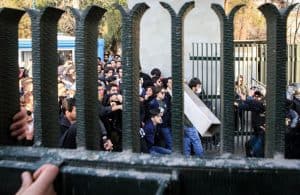
Iranian students battle with riot police at University of Tehran, Dec. 30th (EPA)
Are protesters inside Iran receiving President’s Trump’s Twitter posts in support of their demonstrations, not to mention other factual news on both events in Iran and the outside world?
“‘Iran, the Number One State of Sponsored Terror with numerous violations of Human Rights occurring on an hourly basis, has now closed down the Internet so that peaceful demonstrators cannot communicate,’ President Trump declared via Twitter as President Hassan Rouhani’s government moved to block the Internet on mobile networks across the country. By declaring his support for the protesters on Twitter, Trump waded into a digital battleground that has consumed Iran, where social media has become ground zero in a nationwide fight to control the protest narrative,” Vanity Fair reports.
Getting solid news to the people in Iran, North Korea, China, Cuba, Venezuela and the other dictatorships isn’t easy, especially when there’s a crisis underway. But this is potentially some of the best-used money the US government could spend, making the difference between fighting a war against a country whose population has been brainwashed by its rulers, versus peace with that country, either because the hostile regime doesn’t dare attack given that its domestic support is uncertain, or the hostile regime is overthrown from within by a well-informed populace.
The countries that don’t have a free press or media are enumerated here, here, and here.
The US government has information services throughout the world whose mission is to get the truth into countries whose dictatorships block information from the outside and control all media circulating information within. Iran is one such dictatorship.
TV, radio, the Internet, social networks — these are the means the information services have available to break through the information wall surrounding the dictatorships.
Several of the US information services (Radio Free Europe, Voice of America) date back to the Cold War vs the Soviet Union and communism.
All the US information services are now gathered under one umbrella organization, the Broadcasting Board of Governors (BBG), which consists of eight Governors appointed by the President and confirmed by the Senate, plus the Secretary of State. The Board serves in an advisory capacity to the CEO, who leads the BBG and is also appointed by the President and confirmed by the Senate.
The subsidiary services within the BBG include Voice of America; Radio Free Europe / Radio Liberty, which broadcasts to Iran, Russia, Ukraine, and Pakistan; Radio Free Asia; Middle East Broadcasting Networks, whose broadcasts are in Arabic; and the Office of Cuba Broadcasting.
Voice of America broadcasts into China using Cantonese, Mandarin and Tibetan; Radio Free Asia does so as well, while also adding Uighu. All of the broadcasts into China are very heavily jammed by the country’s Communist Party government.
How well does the BBG do its job?
Sometimes not very well, especially under the Obama administration and during the first months of the Trump administration when Obama appointees still ruled the roost. In April, the Voice of America flubbed an important expose on corruption in the Chinese leadership, apparently in deference to a last-minute intervention by the Chinese government.
In June, an op ed in the Wall Street Journal was headlined “In Iran, Radio Liberty Doesn’t Live Up to Its Name. The Persian-language service too often parrots state media and doesn’t give Israel a fair shake.” The Voice of America (VOA) broadcasts into Iran are receiving similar complaints even now, with nationwide demonstrations against the regime underway.
By statute, the BBG services are supposed to report the news straight rather than be a propaganda outlet for the US. But they’re certainly not supposed to be propagandizing for the dictatorships whose lies they are supposed to be correcting.
Click here to go to the previous Founders Broadsheet post (“US protectionist trade measures, Chinese retaliation, could trigger major stock market correction”)

Leave a Reply